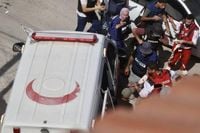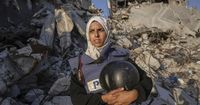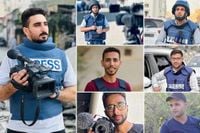The war in Gaza has claimed many lives, but few stories capture both the immense personal and collective loss as vividly as that of Mariam Riad Dagga. On August 25, 2025, Dagga, a 33-year-old Palestinian freelance photojournalist, was killed alongside four other journalists in an Israeli air strike on Nasser Hospital in Khan Younis, Gaza. The attack was described by witnesses and press freedom organizations as a "double-tap" strike: the first missile hit, drawing in reporters and emergency workers, and the second struck minutes later, killing those who had rushed to the scene. According to The Gazette, Dagga had been working with the Associated Press and other outlets, documenting the war's toll on ordinary Palestinians.
Dagga’s death is just one in a staggering series of journalist fatalities in Gaza. In the past two years, more than 200 journalists have lost their lives there—a toll higher than the total number of journalists killed in the conflicts of Yugoslavia, Vietnam, Afghanistan, and both World Wars combined, as reported by The Wire and press freedom groups. Since the Gaza war began in 2023, the Committee to Protect Journalists has confirmed the deaths of 197 journalists and media workers, 189 of them Palestinians, making Gaza the deadliest place in the world for media workers in modern history.
For Dagga’s family, her death is not just a headline but the loss of a beloved daughter, cousin, and mother. Maisaa Abudagga, her cousin living in Coralville, Iowa, described her as “everywhere in Gaza, risking her life, risking everything at the same time taking care of family members.” Dagga’s devotion to both her work and her family was legendary. Years before the current conflict, she donated one of her kidneys to save her ailing father. She supported siblings and nephews when they lacked shelter, and even as a teenager, cared for elderly relatives before she had finished school.
Dagga’s path to journalism was not easy. After marrying young, she chose divorce when her husband refused to let her pursue higher education. She left with her young son, enrolled in journalism school, and built a career in one of the world’s most dangerous places to be a reporter. “She said no one was going to decide for her that she couldn’t go to college,” Maisaa told The Gazette. “She took care of her son, finished college, and worked hard until her last minute.”
This determination was evident in her reporting, which captured not just the broad sweep of war—displaced families, crowded aid lines, funerals, and wounded children—but also the tragedies of her own family. In 2018, Dagga’s brother was killed during a protest at the Gaza border. She was there as a young journalist, unknowingly recording his final moments. “She was literally the reporter of every death in this family and more,” Maisaa said. “If a strike hit and we didn’t know what happened, we waited until Mariam told us.”
The risks for journalists in Gaza are extreme. According to the Associated Press, the Israeli military said the back-to-back strikes on Nasser Hospital—which killed at least 20 people, including the five journalists—were aimed at a Hamas surveillance camera. The military provided no evidence for this claim, and its account conflicted with eyewitness reports. Rights groups and international observers condemned the strike as a violation of international law, noting that Israeli authorities have often labeled emergency workers as militants without corroboration. An Israeli army spokesperson told the AP that none of the journalists killed in the strikes was suspected of being associated with militant groups and that they were not targeted. Prime Minister Benjamin Netanyahu called the strike a “tragic mishap” and stated that Israel values the work of “journalists, health workers, and all citizens.”
Yet, the pattern of journalist deaths and the restrictions on foreign reporters entering Gaza—who must be accompanied by the Israeli military—have fueled concerns that the world is not meant to see what’s happening on the ground. The Wire recently reported on the Israeli military’s special “Legitimisation Cell,” whose role is to identify Gaza-based journalists it could portray as undercover Hamas operatives, in an effort to blunt growing global outrage over the killings of reporters. Maisaa and her husband Yaser believe these actions are part of a broader effort to control the narrative, saying, “Israel has sought to silence Palestinian voices and waged a relentless battle to control the narrative about the fighting by preventing foreign correspondents from entering Gaza independently, unless accompanied by the military, citing safety and security concerns, and casting local reporters as Hamas affiliates.”
Despite the danger, Dagga refused to align herself with any political faction. “She wanted to be closer to the people,” Maisaa said. “That’s what a real journalist should do instead of following any political party.” Dagga embedded herself with families and displaced residents, striving to show the world the suffering and humanity of Palestinians. In her final days, she sent relatives a voice message: “I feel like it’s closer. The heaven is waiting for me.” She also left behind two wills—one for her 14-year-old son, urging him to “be a good boy, to focus on his future because things will change,” and asking him to name a daughter after her if he ever had one. The second was for her colleagues, telling them, “Don’t cry over me. This is our destiny. Keep supporting and telling the truth about Gaza.”
Her story, family members say, carries a simple but urgent message: Palestinians are human beings deserving of dignity. “She wanted to deliver the message that we’re not less human than anyone else,” Maisaa said. “We love our community. We love all people. We thrive, even in tents, because we want to participate in humanity.” Dagga’s relatives hope her legacy will inspire others to speak out. “She believed in the power of people,” Maisaa said. “I wish I can be Miriam here. I want everybody to be Miriam and use their voices. We can’t change this alone, but together we can.”
As the war in Gaza grinds on, the loss of journalists like Mariam Riad Dagga is not just a tragedy for their families, but a blow to the world’s ability to witness and understand the conflict. Their courage and sacrifice underscore the critical importance of press freedom—even, and especially, in the darkest of times.



